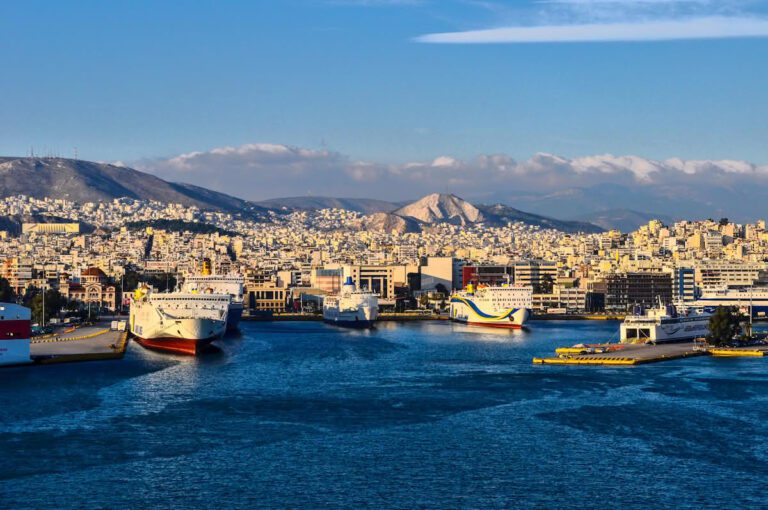
President Xi’s state visit to Greece on 10-12 November 2019 attracted massive interest at a time Beijing is at loggerheads with Washington. The extensive media coverage in Greece and China alike was mostly triumphalist, with no shortage of references to the “two most glorious civilizations in the history of mankind”. Alongside his visit to the Acropolis and the port of Piraeus, the main political outcome was the signing of 16 agreements and MoUs with Greek authorities. Government sources in Athens indicate that Xi was keen on having a “double-digit” number of documents signed, which explains the content of the list – there are only five agreements, while the rest are MoUs or protocols. For the record, back in 2014 Chinese premier Li Keqiang decorated his visit to Greece with 19 agreements and MoUs.
Now that the lights are off, a useful assessment of the state of play in Sino-Greek relations would require a matter-of-fact approach and some digging beneath the surface. If Greek stakeholders are to make sense of where the two countries stand, there are four key questions that should be posed: (i) will access to the vast Chinese market become easier for Greek exporters and investors from now on; (ii) what can Greece expect in terms of FDI on its way to much-needed economic recovery; (iii) how useful can China’s drive in the sphere of culture and education be for Greece; (iv) what are the (geo)political implications of China’s footprint in the country?
Trade and Investment
Quite understandably, Greece eyes the huge Chinese market for its exports. Two of the protocols signed in Athens envisage the promotion of Greek agricultural produce – in particular, saffron and kiwi, while olive oil and feta cheese are also key export items. Greece’s trade deficit has come down to a 4:1 ratio, €900 million vs €3.6 billion last year, while it used to be more than 10:1 in favour of China in the 2000s. Boosting Greek FDI in China is also one of the priorities set by prime minister Mitsotakis, who attended the opening ceremony of a Greek elevator producer in Shanghai.
In return, Beijing views Piraeus, controlled by the shipping behemoth COSCO, as a significant gateway to European markets further north and wants to turn it into the biggest commercial harbor in the Mediterranean. While the port’s throughput already exceeds 5 million twenty-foot container equivalent units (TEUs), COSCO plans to double its handling capacity. Hence the pressure put by Beijing on Greek authorities to mediate between the Chinese side and local stakeholders who are afraid that they may be left out in the cold. An MoU, one of the 16 documents signed last week, specifically refers to “overcoming remaining obstacles” for the implementation of COSCO’s expansion plan, as Greek authorities have not yet approved the construction of a fourth pier and a new car terminal.
A big chunk of Chinese imports into Europe, worth €395 billion last year, is transshipped through Greece’s principal sea port. No doubt, COSCO’s investment has been very successful in operational and managerial terms. Yet, a closer look at the distribution of benefits, which should also factor in the total worth of Chinese commodities entering Europe via Piraeus, would show that the economic gains are overwhelmingly in favour of China. For all that, the Mitsotakis government wants to use Piraeus as a showcase and a proof that the country is turning into an attractive destination for foreign investment. While Greece has graduated from three bail-out agreements with international creditors, the national economy is still far from crawling out of the woods. Facing a huge investment gap, estimated by PwC at some €30 billion a year, Greece certainly needs a large volume of FDI, be it from China or elsewhere.
Until recently, Chinese companies took interest in Greece’s coal-fired power plants, but the Mitsotakis government’s lignite divestiture policy has brought about a shift to other energy-related areas. State Grid, which holds a 24% stake in the national transmission grid operator ADMIE, will be involved in the construction of two power supply underwater cables between mainland Greece and Crete. Renewables, e.g. solar farms, are also on the list of projects, which was only to be expected. China is the biggest producer of solar panels worldwide and, now that state subsidies have been slashed, its companies are desperate to tap overseas markets. A list of prospective investment projects with the involvement of Chinese contractors includes wind parks as well as waste management facilities, where Greek authorities badly need state-of-the-art recycling and disposal systems. Notably, Athens stands ready to discuss with Beijing further privatization of ADMIE and state-owned energy corporations.
Other Areas of Economic Cooperation
Shipping is a strategically important area of bilateral cooperation, with Greece and China owning the first and third biggest commercials fleets, respectively. A few days before Xi’s arrival in Athens, the Greek prime minister ruffled some feathers in Shanghai by pointing out that China should remain open to Greek suppliers of shipping equipment and services – there are reports about newly added obstacles to the provision of maritime services by foreign companies to vessels in Chinese waters. Nonetheless, more than 1,000 Greek-owned ships, worth some €50 billion, have been built in China over the last 15 years. Chinese banks have been active in the provision of loans to Greek ship owners, which may be part of the rationale behind the decision of the Bank of China (BoC) to open a branch in Greece. The Industrial and Commercial Bank of China (ICBC) will follow suit with a representative office.
At the same time, BoC and ICBC may well be interested in the booming real estate sector and tourism as well. Greece expects large cohorts of Chinese tourists, thanks to direct flights between Athens and Beijing three times a week, and a new air link to Shanghai to be launched next summer. Currently, Greece is visited by some 200,000 Chinese tourists a year, while figures of up to half a million by 2021 were floated as a target during the official talks. Meanwhile, the share of Chinese holders of Golden Visas is close to 65% of the total and keeps climbing up. However, Athens may have to rethink its Golden Visa policy, as Greece has the lowest threshold, at €250,000, in all of the EU. Greek authorities will have to tread carefully on this issue for yet another reason – the policy of allowing foreign citizens to buy EU residency or even citizenship is increasingly in the crosshairs of the European Commission.
Culture and Education
Cultural cooperation between China and Greece goes down well with the public, despite a strong element of hype. A Chinese Studies Centre is to be set up at a private foundation that belongs to a well-established shipping family in Piraeus. One more Confucius Institute, in addition to the existing two, will open soon. The Greek state television and China’s National Radio and Television Administration, a ministry-level executive agency directly under the State Council of China, have also signed an MoU. Furthermore, the Chinese side is eager to promote film co-production, starting from a blockbuster about the large-scale evacuation of Chinese workers from Libya in 2011, when Greek commercial ships came to their rescue.
Broader Political and Geopolitical Context
Unlike the seemingly “painless” sphere of culture and education, the political ties between Athens and Beijing are becoming increasingly fraught with controversial issues. The very first item on the list of agreements relates to the extradition treaty signed between Greece and China. It took the two sides quite some time to come to terms, due to concerns over the death penalty in China, which runs counter the EU position on this issue. Greek government officials state that this has been taken into account in the final text of the treaty, but the practical implications of its implementation will surely be closely scrutinized by human rights watchdogs.
Furthermore, a number of goodwill political gestures to Beijing that marked the previous government’s foreign policy breed suspicion that Greece is turning into China’s fifth column or Trojan horse in Europe. Kyriakos Mitsotakis is unlikely to infuriate western partners the way his predecessor Alexis Tsipras did, but he will have to double down on convincing them that there is a safe way of doing business with China without compromising Athens’ allegiance to the EU and NATO. Interestingly, there is no hint whatsoever to 5G in the deals struck during Xi’s visit, which may well be attributed to American objections. There was nothing ambiguous in the warning by Secretary of State Mike Pompeo against Chinese 5G technology, when he flew to Athens in early October 2019 to sign a new bilateral defence cooperation agreement.
Greece needs to walk a fine line between two competing priorities. On the one hand, it badly needs to attract foreign investment capital and boost its exports, and China is seen as an ideal economic partner in both respects. On the other hand, Greece is feeling the heat in an increasingly turbulent region, with an unpredictable Turkey next door, Syria not too far away and Libya right across the Mediterranean. Migrant flows are surging once again and are posing a major threat to the country. Hence the closer military ties with the US and the Mitsotakis government’s efforts to mend fences with the EU. It has now become clear that China is essentially a trade partner and a potential investor, but not a security provider in the Eastern Mediterranean and the Balkans.
Greece will seek to make the most of its membership in the Beijing-led 17+1 format, which the Tsipras government endorsed last April. Mitsotakis will keep the country in this platform, as long as he sees it as an opportunity to claim back Greece’s role in Southeast Europe and particularly in the Western Balkans, a region riddled with uncertainty and angst about its future. The Greek prime minister states he will be back in China next April for the upcoming 17+1 summit, but this has more do to with the promotion of economic ties between Greece and China. In reality, Athens does not need the 17+1 outfit to promote its agenda in the Balkans – notably, Mitsotakis met his counterparts from North Macedonia and Bulgaria at a Thessaloniki economic summit last week and Albania’s prime minister visited Athens last month.
Recalibrating the Sino-Greek Relationship
A week after Xi’s visit to Athens and the salvo of pompous statements about Sino-Greek ties as a model for relations between China and Europe, a less enthusiastic mood transpires through tête-à-tête conversations with Greek stakeholders. There is a sense that, by and large, Sino-Greek relations remain tilted towards Beijing and do not fully justify the hackneyed “win-win” catchphrase. Representatives of business circles feel that they could have got more in terms of access to the Chinese market and pose ironic questions about Greece’s “kiwi diplomacy”. In addition, there are the beginnings of a debate on the extent, to which Chinese investment in the country serves Greek national interests. The geopolitical conundrum in the region is becoming more and more complicated by the day and Athens needs reliable allies. Which is why it is time for Greece to debunk some of the myths flying around and seek a recalibration of Sino-Greek relations in a meaningful way.
Written by
Plamen Tonchev
TonchevPlamenPlamen Tonchev is Head of Asia Unit at the Athens-based Institute of International Economic Relations and European China Policy Fellow at MERICS, Berlin.


